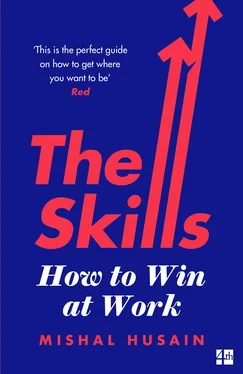In both my parents’ families, mine would be the third generation in which women had had educational opportunities comparable to men – back in the 1930s, in what was then British India, my two grandmothers were enrolled on medical and nursing courses respectively. In the 1980s, it was the desire for me to have the best possible education that made my parents opt for an English boarding school rather than have me stay in Saudi Arabia, where we were then living. It was a decision that meant difficult airport goodbyes and long separations. Years later, I discovered that quality of schooling was not the only factor. As a teenage girl in Saudi Arabia I would have had to wear the long black abaya , or cloak, and a headscarf every time I left the house. My parents worried that being subject to those constraints as part of my daily life might fundamentally alter my sense of what I could go on to achieve.
All of this support helped to propel me forward through my teenage years, but sometime during university I think I became less sure of myself and more self-conscious. I would have gained so much more from the experience of university had I been more willing to ask questions, to take risks and to test out arguments in front of my lecturers and fellow students. Instead, I was rather too cautious, apprehensive that I might have misunderstood, misjudged or appear uninformed. Something of that persisted in the first part of my professional life, when I was a producer first at Bloomberg TV and then at the BBC, before getting into presenting at the age of twenty-seven. I would mull over running orders and scripts in search of the ideal turn of phrase or link between one story and the next. I would approach new projects, such as working on the Olympics, almost like an exam – setting aside time for preparation, making extensive notes in advance and trying to cover every base. Working on Today knocked that search for perfection out of me for the most basic of reasons: the shortage of time focused the mind like nothing I had previously experienced, forcing me to trust my instincts and judgements and helping to give me a new-found courage.
I look back now and wish that I had kept hold of my self-belief all along the way. Instead, somewhere between entering the workplace and having to rise to the challenge of a particularly exacting role, it took a back seat. The socialisation of girls and the way they can then end up deferring to their male peers was certainly a factor, but later on it was also hard to hold on to a sense that I could make it into senior roles through the intense periods of pregnancy and early parenthood. The top of my chosen field, as in many others at that time, was one where women were under-represented, and women of colour more so.
Even today, and even in the most progressive nations, too many companies and workplaces can be gender-mapped into a pyramid shape: women and men represented in equal numbers at entry level but the presence of women tailing off dramatically the more senior the role. 1At the beginning of 2018, just seven women were leading FTSE 100 companies, fewer than the number of men called David occupying the same positions.2 A century after the first woman was elected to Parliament at Westminster, around two-thirds of British MPs are men,3 with a similar picture among partners in law firms in England and Wales, where only a third are women.4 On the airwaves, a 2018 study of the UK’s six most prominent broadcast news programmes found 2.2 male experts appearing for every female one.5 In some professions, even the entry level is seriously out of kilter – only around 12 per cent of all engineers in the UK are female.6 After the Harvey Weinstein scandal, the actor Emma Thompson called the lack of women in the film industry a ‘gender dysfunction’, part of a malaise within the system. ‘There are not nearly enough women, particularly in Hollywood, in positions of power. There aren’t enough women at the top of the tree – in the studios – who could perhaps balance everything out. There aren’t enough women on set. This is part of our difficulty.’7
I still find myself in settings that are overwhelmingly male, often at conferences – including the high-profile World Economic Forum, in Davos, where many of the women present are journalists or conference staff. It can be intimidating to look around the room and become conscious of being one of a small minority. Or you can see it as a galvanising moment. At Davos, I was once in an off-the-record media session with the Iranian president when, as the questions began, I debated whether I had one worthy of asking. And then I realised that as there were only about ten women in a gathering of well over a hundred people, if I didn’t speak up, the session might well end without a female voice being heard at all. Suddenly, the principle of participation seemed far more important than the actual question. I stuck up my hand and spoke.
We are in a time of increased awareness about the importance of representation across so many groups, but when I hear people say confidently that their daughters won’t experience the same realities and the same barriers, I am not convinced. My generation has had opportunities that most of our mothers did not, but we’ve also come up against obstacles that many of us expected would be gone by now. Work and childcare remain a difficult balancing act for too many women, and the bulk of home responsibilities are also mostly ours. Gender pay gaps illustrate the paucity of women in higher-paid roles, while equal pay claims raise questions about how women are perceived and valued in comparison with their male colleagues. Those gaps can be there even when women are in the most pre-eminent positions – such as Claire Foy in the lead role of Queen Elizabeth in The Crown , who was paid less than the male actor in the supporting role of her husband Prince Philip.
It seems to me that men set off on their careers with an expectation of advancement, unburdened by the questions or worries that can dog women – especially what may lie ahead of them in terms of juggling a career and family life. Bearing the weight of childcare responsibilities can reduce the ability to take advantage of salary-boosting job offers, because women are more tied to their commute, working hours and keeping their routine unchanged. And when they take up part-time and flexible working options the result can be a disproportionate wage penalty, a promotion penalty or simply a perception that their priorities now lie elsewhere. Ellen Kullman, who was one of the most powerful women in American business when she was running the corporate giant DuPont, has said that during her time in that company, women were being promoted every 30–36 months, while men were moving on every 18–24 months. The women seemed to be regarded as needing longer to show their capability.8
Perceptions can also be a barrier to women’s own sense of their potential. I know that when I close my eyes and conjure up an image of someone at the top of my chosen profession – a main presenter or a prominent interviewer – I see a man. I see a white man, as it happens. This reflects the reality of the world that has surrounded me in my time in broadcasting, but there is an internal effect, too, which makes it harder to imagine yourself in those pole positions one day. Early on in my career, there were times when I felt my suggestions weren’t taken as seriously as a man’s might have been (‘Stick to what you’re good at’ was one comment from a manager when I offered an opinion beyond my core brief). And even now, there are times when a prominent contributor walks into the studio and looks across at my co-presenter, and I imagine them wishing he was doing the interview with them rather than me.
It has taken me a while to feel I have a right to be in that room, in a position that allows me to question some of the most powerful people in the land. It’s what I think of as the third phase of my career. During the first, when I got a foot in the door of the news industry, I felt an immense thrill – although there was also a period on overnight shifts when it was hard to feel energised about anything at all. I certainly didn’t think about a future as a presenter, which was a world away from my life at that time. However, the business programme I was working on at the BBC sometimes got producers to do short on-camera wraps of the day on the financial markets. After doing this a few times I was offered some reporting shifts. Then, one week, there was a gap in the business presenters’ rota and I was asked to fill in, my knees shaking under the studio desk as I did so. I never went back to being a producer and in the next few years the opportunities came thick and fast – I had a stint based in Singapore and one in Washington, by which time I was with the international channel BBC World News.
Читать дальше












